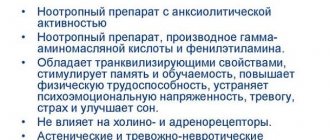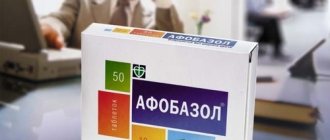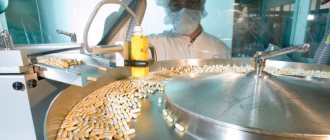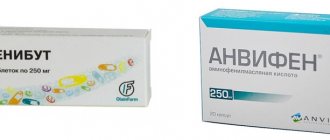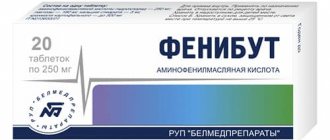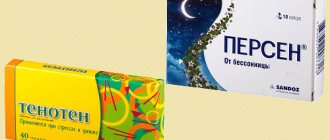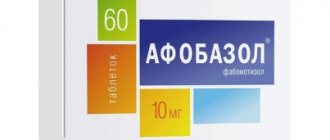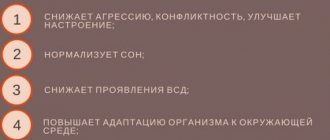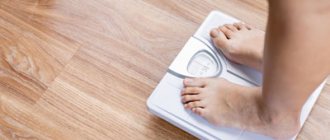Update date: 01/11/2021 15:54:46 3393 Share:
Author: Maria Feldshtein
*Review of the best according to the editors of simplerule.ru. About the selection criteria. This material is subjective in nature, does not constitute advertising and does not serve as a purchase guide. Before purchasing, consultation with a specialist is required.
According to medical statistics, about 4% of the world's population suffers from anxiety disorders. Interestingly, in Europe and North America this condition occurs more often - on average in 7.7% of people, while in Asia - only in 2.8%.
In the treatment of such disorders, drugs of various pharmacological groups are used - in particular, anxiolytics and nootropics. Representatives of these categories of drugs include Afobazole and Phenibut. The drugs differ in composition and mechanism of action, but are prescribed in similar situations. What is the difference between them - read the article.
| The drug and its characteristics | Phenibut | Afobazole |
| Pharmacological group | Nootropic drugs | Anxiolytics - anti-anxiety drugs |
| Active substance | γ-amino-β-phenylbutyric acid hydrochloride | Fabomotizole hydrochloride |
| Release form | Pills | Pills |
| Manufacturer | “Ozone”, “Organika”, etc. (Russia) | OTCPharm (Russia) |
| Price | 60-250 rub. | 300-400 rub. |
| Vacation at the pharmacy | On prescription | Over the counter |
Indications for use
Afobazole and Phenibut have one common indication - the treatment of anxiety disorders. These drugs calm the nervous system, relieve anxiety and fear, and improve the quality of life.
Other indications for prescribing drugs vary
Afobazole
Afobazole is used for certain somatic diseases accompanied by anxiety - for example, VSD, irritable bowel syndrome, bronchial asthma and hypertension. The drug normalizes brain activity, helps lower blood pressure and stabilizes heart rate. Afobazole is prescribed only in combination with other drugs and is not the only drug in this situation - it relieves accompanying symptoms, but does not treat the underlying disease.
Afobazole is also prescribed in the following situations:
- premenstrual syndrome;
- alcohol withdrawal;
- relief of withdrawal symptoms when quitting smoking;
- sleep disturbances caused by anxiety;
- adaptation disorders.
Phenibut
Phenibut is used in more complex cases:
- obsessive-compulsive neurosis;
- insomnia and nightmares;
- enuresis, stuttering and nervous tics in children;
- Meniere's disease;
- open-angle glaucoma;
- symptomatic therapy in the treatment of alcohol dependence.
Phenibut is also prescribed as a premedication before surgical operations and diagnostic procedures.
Description of Afobazole
Afobazole is a tranquilizer based on fabomotizole. Available in tablets. The manufacturing company is Pharmstandard-Leksredstva in the Russian Federation. Can be purchased without a prescription.
The drug gives a psychostimulating effect. The mechanism of action is based on a combination of anti-anxiety and stimulating effects. Reduces anxiety, increased irritability, somatic symptoms of anxiety. Helps with cognitive impairment, stress, and depressed mood. It is especially effective when used for asthenic features.
The effect from the moment the drug is prescribed develops within a week. A lasting result is observed by the end of the month of therapy and lasts for another 14 days. The advantages of the drug are that it does not cause muscle weakness and does not lead to withdrawal symptoms.
Research and effectiveness
Afobazole was developed in the early 2000s and was the result of a search for effective anxiolytics without the side effects that are typical for this group.
Open studies have shown the drug's effectiveness in anxiety disorders, but the lack of RCTs limits the evidence base, which makes it impossible to recommend Afobazole as a first-choice drug.
Sources: Gorodnichev A.V. Current trends in the treatment of anxiety disorders: from scientific data to clinical recommendations. Socio-political thought. 2012.
Contraindications
Afobazole has few contraindications, but they cannot be ignored. These include pregnancy and breastfeeding. Afobazole is not used in the treatment of children and is prohibited under 18 years of age. It should also not be taken if you are intolerant to galactose.
Side symptoms
Afobazole is a well-tolerated drug. Possible adverse reactions include only allergic manifestations and headache. The last symptom is short-term and does not require discontinuation of the drug.
It is possible that treatment may be accompanied by other unpleasant side reactions, which may be due to combination with other medications. The doctor should know what medications were taken before the start of the course and are planned to be taken in the future. Some of them may have to be canceled or replaced.
Dosage
Should be taken after meals. Single dose – 10 mg, daily dose – 30 mg. The standard course is a month. The dosage can be increased to 60 mg, and the duration of therapy up to 12 weeks on the recommendation of the attending physician.
In case of severe overdose, a sedative effect occurs and drowsiness occurs. For emergency care, a 20% caffeine solution is administered subcutaneously, 1 ml 2-3 times a day.
To whom is it assigned?
For adults, the drug is prescribed for anxiety conditions and neurasthenia. Can be prescribed for somatic diseases - asthma, IBS, ischemic heart disease, hypertension, arrhythmia, oncological pathologies.
Afobazole can be included in complex treatment for sleep disorders, neurocirculatory dystonia, and abstinence. The product helps to relieve symptoms of PMS and withdrawal symptoms when quitting smoking.
How do drugs work?
Phenibut and Afobazole contain different active ingredients and differ in their mechanism of action.
Phenibut
Aminophenylbutyric acid hydrochloride, the active substance of the drug, affects the functioning of the central nervous system. Being a derivative of GABA, it acts as an inhibitory transmitter. The drug normalizes metabolism and blood flow in brain tissue. It has a weak anticonvulsant effect - and although it is not used as a drug for the treatment of convulsive conditions, it improves the functioning of the central nervous system,
When taking Phenibut as a course:
- reduces manifestations of asthenia;
- relieves vegetative symptoms;
- eliminates feelings of anxiety and fear;
- improves attention and memory;
- increases mental and physical performance;
- normalizes sleep.
The nootropic drug, according to the official instructions, penetrates all tissues of the body, passes into the brain, is well distributed in the liver and kidneys, but does not accumulate and is released within three hours after administration. In brain tissue, the concentration of the drug remains high for 6 hours.
Afobazole
Fabomotizol in the drug also acts on the central nervous system, but it works through other structures - sigma-1 receptors. The drug restores the sensitivity of these receptors to inhibitory mediators and has a calming effect on the central nervous system.
Afobazole works in two directions at once. As an anxiolytic, it relieves feelings of anxiety and fear, eliminates irritability and tearfulness, helps to relax and normalizes sleep. As a stimulant, it improves brain activity. Afobazole also eliminates vegetative symptoms that occur due to anxiety - sweating, rapid heartbeat, dry mouth, dizziness, etc.
Phenibut
Phenibut is a nootropic drug. The drug improves sleep, eliminates feelings of anxiety and fear, and helps cope with symptoms of asthenia such as headache, irritability, and apathy. Thanks to taking the drug, memory improves, cerebral circulation is normalized, and performance increases. The drug usually begins to act very quickly, significantly improving the person’s condition.
But, despite such a beneficial effect on the body, Phenibut is a serious drug that is only available with a doctor’s prescription.
Indications
- Prevention of motion sickness during long trips, as well as dizziness due to Meniere’s disease or disorders of the vestibular apparatus;
- Nystagmus. At the same time, the severity and duration of involuntary eye movements decreases;
- Asthenia and neurotic conditions, manifested in insomnia, emotional instability, fear, anxiety, obsessive states;
- To eliminate feelings of anxiety and fear before operations or complex diagnostic procedures;
- In childhood, Phenibut is taken to eliminate stuttering, tics, and is also prescribed for hyperactive behavior of a child;
- Phenibut can also be prescribed as part of a complex treatment for alcohol withdrawal.
Contraindications and side effects
Contraindications for the drug include children under 3 years of age, but in some cases Phenibut can be prescribed to children at an earlier age. In addition, the drug should not be taken if you are hypersensitive to the components of the drug, as well as during the 1st trimester of pregnancy and nursing mothers.
If the patient has a history of ulcerative or erosive gastrointestinal diseases or liver failure, Phenibut is taken with extreme caution.
Side effects
- Nausea, rarely vomiting;
- Allergic manifestations in the form of an itchy rash;
- Headache and dizziness;
- Drowsiness;
- Despite the fact that Phenibut is prescribed as a sedative, in some cases it has the opposite effect. A person develops irritability, anxiety and fear.
Such side effects usually occur when the rules of administration are not followed and the recommended dosage of the drug is exceeded.
The average course of treatment with the drug is 4-6 weeks. With long-term use, the blood picture may change and have a negative effect on the liver. Therefore, if long-term use of Phenibut is necessary, it is necessary to monitor these indicators.
Assessing the effectiveness of drugs
Comparative studies of the two drugs - Phenibut and Afobazole - have not yet been conducted. Since Phenibut is more often used in psychiatry, and Afobazole is used as an adjuvant for mild anxiety disorders, their scope of use usually does not overlap. Therefore, we studied each drug separately and can evaluate them in terms of effectiveness and safety.
Phenibut
In the international medical knowledge base PubMed, there are about 200 articles on the active substance included in the drug - but most of them describe the effect of the drug in laboratory conditions (in vitro). Tests on humans are also available, but they do not meet international standards. For example, there is evidence that the drug:
- tension headaches in children and adolescents;
- fight chronic fatigue;
- used in children;
- helps to cope with;
- alleviates the condition.
But from the standpoint of evidence-based medicine, Phenibut is considered an ineffective drug.
Afobazole
There is also no serious evidence base for Afobazole. They talk about him only in Russian-language literature:
- Afobazole for anxiety and neuroses. There is evidence that the drug acts slowly but effectively: it improves well-being in the 4th week of treatment and causes virtually no adverse reactions.
- Afobazole and for generalized anxiety disorders. Scientists believe that the drug can be used over a long course without reducing its effectiveness.
- There is no mention of this drug in PubMed or the Cochrane Library.
Which drug is better
Phenibut and Afobazol are produced in Russia, have the same release form, and have some similar therapeutic effects - they help with anxiety disorders. They can be prescribed for the same pathologies, but are not interchangeable.
Phenibut acts more quickly, but has more side effects, can cause withdrawal syndrome, and has a bad effect on the gastrointestinal mucosa. This is a stronger drug that is prescribed for serious disorders. Afobazole is inferior in that it cannot be used before the age of 18.
Afobazole and Phenibut should not be used for self-medication. The use of funds must be justified, so you should first consult your doctor.
Adverse reactions
According to the instructions, the drugs can cause the following symptoms:
- Phenibut: irritability, increased excitability, increased anxiety, headache, dizziness, drowsiness, skin rash. At the beginning of therapy there may be nausea.
- Afobazole: allergic reactions. There may be a headache, but it goes away on its own and does not require cessation of therapy.
Drug comparisons
Now you can make a comparative description of the drugs. The drugs are similar in their release form, because both drugs are produced in the form of tablets. In addition, the indications for the medications are similar, so often in stressful situations Afobazol acts as an analogue of Phenibut. But for other diseases, especially those associated with metabolic disorders and blood circulation in the brain, Afobazol will be ineffective.
Differences:
- Main active ingredient. In Afobazole it is fabomotizole, and in Phenibut the active substance is aminophenylbutyric acid;
- Mechanism of action. Afobazole has an anxiolytic effect, in other words, the drug acts on the subcortical areas of the brain that are responsible for emotional reactions, and as a result the person calms down. Phenibut, in addition to eliminating stress, improves cerebral circulation;
- Age of application. Afobazole is approved for use only by adults. But doctors prescribe Phenibut in childhood;
- Phenibut differs from Afobazole in the time of onset of the effect. When taking Phenibut, the effect occurs a little faster. Afobazole begins to act, gradually accumulating in the body. The maximum effect of Afobazole is achieved only at the end of 4 weeks and continues for another 14 days;
- Safety. Despite the fact that Phenibut is approved for use in children, unlike Afobazole, it has an irritating effect on the gastric mucosa. In addition, Phenibut, if taken incorrectly and for a long time, can cause addiction and withdrawal symptoms.
- Release of the drug. Phenibut is available only with a prescription, and Afobazol can be bought without a document;
Another difference is that Afobazole is a more modern drug. Phenibut is an older generation drug, so it has a more impressive list of side effects.
Indications
The drug is prescribed for
- a state of high causeless anxiety;
- asthenic neuroses;
- violations of mental adaptation mechanisms;
- anxiety disorders provoked by serious illnesses, traumatic events and situations;
- somnic disorders with stress causes;
- disorders of the psychoemotional state during PMS in women;
- withdrawal syndrome caused by dependence on nicotine, alcohol;
- impaired concentration under stress.
Depending on the severity of the mental state, the drug is used independently and as part of complex treatment.
